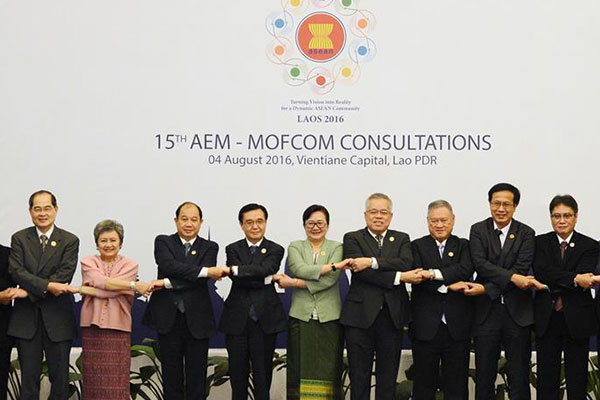
Delegates pose for a group photo during the 15th China-ASEAN (10+1) economic ministers’ meeting in Vientiane, Laos, on August 4, 2016. [Photo/Xinhua]
VIENTIANE — After 25 years of fruitful dialogue relationship, China and the 10-member Association of Southeast Asian Nations (ASEAN) are looking forward to fostering stronger ties especially in economic and trade fields in a time of global economic uncertainties and instabilities.
As ASEAN economic ministers met in the Lao capital this week for the 48th ASEAN Economic Ministers Meeting (AEM) as well as talks with their partners, China and ASEAN took the opportunity to reiterate their will to further boost cooperation.
The China-ASEAN relations have grown to a level that exceeds the expectations 25 years ago, said Chinese Minister of Commerce Gao Hucheng after meeting with his ASEAN counterparts.
“Our developments, from economic to social fields, are tightly bound to one another,” he told reporters on the sidelines of the AEM meeting.
Chinese leaders have vowed to build a community of common destiny with ASEAN as this year marks the 25th anniversary of the establishment of China-ASEAN dialogue relationship. Bilateral trade reached $472 billion last year, up from $7.96 billion in 1991, with an annual growth rate of 18.5 percent.
Despite the uncertainty in the global economy, China maintains its position as ASEAN’s largest trading partner while ASEAN is China’s third biggest. By the end of May, their two-way investment exceeded $160 billion.
The two sides, which signed an agreement to upgrade their free trade area (FTA) late last year, are targeting bilateral trade at $1 trillion by 2020.
It is timely to further strengthen ASEAN-China trade and economic cooperation, economic ministers from both sides said in a statement issued after their meeting.
Gao said participants at the meeting shared the same concern over the slow recovery of global economy and the increasing emergence of new challenges, who jointly called for more attention on global cooperation and warned against excessive trade protectionism.
In a move to enhance bilateral cooperation, ministers from both sides also agreed to recommend the adoption of a joint statement between ASEAN and China on industrial capacity cooperation as a deliverable of the commemorative summit marking the 25th anniversary for China-ASEAN dialogue relationship in September.
This is in line with a five-point proposal raised by the Chinese side, who also vowed to work with ASEAN on the construction of the Belt and Road Initiative, enhance regional integration and expand new cooperation areas.
The Belt and Road Initiative, proposed by China in 2013, is aimed at reviving ancient trade routes which span Asia, Africa and Europe.
Ministers from both sides agreed that China’s cooperation proposal is in the right direction for jointly combating economic downside pressure and pushing forward regional cooperation, according to Gao.
“We all agree that globalization is still a trend that benefits all countries and brings them closer and only prosperity and close relations would make this world a safer place,” he said.
